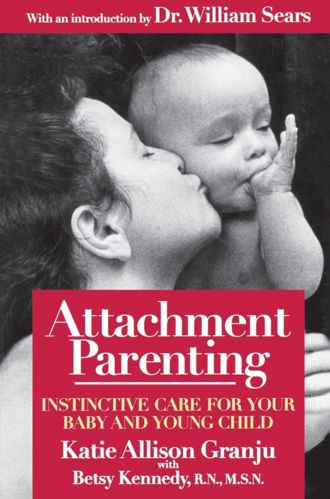In today’s bustling world of parenting advice, it’s always refreshing to find a book that resonates with our natural instincts. In this review of Attachment Parenting: Instinctive Care for Your Baby and Young Child, we’ll explore the guidance offered by authors Katie Allison Granju and Betsy Kennedy.
This comprehensive guide to attachment parenting encourages parents to trust their instincts and be responsive to their babies needs, focusing on concepts such as attentive response to cries, minimizing separation, avoiding sleep training, breastfeeding on demand, and babywearing.
Find this book in our carefully curated best attachment parenting books article.
Table of Contents
Introduction
Parenting is a journey filled with joy, love, and the occasional sleepless night. It’s also a time when parents are bombarded with advice from every direction.
One approach that has garnered much attention in recent years is attachment parenting. With the publication of Attachment Parenting: Instinctive Care for Your Baby and Young Child, Katie Allison Granju and Betsy Kennedy have provided a comprehensive guide to this nurturing and intuitive parenting style.

This review aims to provide an in-depth look at the book’s content, exploring its key concepts, practical advice, and potential criticisms.
By the end of this review, you’ll better understand whether this book is a good fit for your parenting journey and if attachment parenting aligns with your values and instincts as a caregiver.
Pros and Cons
Pros:
- Offers a wealth of information and support for parents interested in attachment parenting
- Comprehensive and evidence-based
- Filled with practical advice
- Easy-to-follow writing style
- Resonates with many parents seeking a more instinctive approach to caring for their children
Cons:
- May not suit all parenting styles
- Lacks cultural diversity
- Focuses heavily on the early years of childhood
- Some readers find the book outdated
- Occasionally aggressive in tone
Overview and Key Concepts
Attachment Parenting: Instinctive Care for Your Baby and Young Child delves into the principles of attachment parenting, which emphasizes the importance of consistently meeting a child’s physical and emotional needs.
The book reinforces that a secure attachment between caregiver and child is crucial for healthy emotional, social, and cognitive development.
The authors explore the “7 Baby B’s” of attachment parenting, which include concepts such as:
- Birth bonding
- Breastfeeding on demand
- Babywearing
- Bedding close to baby
- Belief in the value of baby’s cries
- Balance and boundaries
- Beware of baby trainers
These principles serve as a foundation for attachment parenting and guide parents looking to foster a strong, nurturing connection with their child.
Strategies and Practical Advice
One of the book’s strengths is its emphasis on practical advice and real-world strategies for implementing attachment parenting principles. Some of the techniques and suggestions offered in the book include:
- Trusting your instincts as a parent and responding to your baby’s needs, even if it means deviating from conventional wisdom or advice
- Learning how to breastfeed on demand and understanding the many benefits of this practice for both mother and baby
- Embracing babywearing as a way to maintain physical closeness and meet your baby’s need for touch and security
- Considering co-sleeping arrangements that allow parents and babies to share a sleeping space while still maintaining safety and comfort
- Recognizing the importance of responding to your baby’s cries as a way to build trust and foster a secure attachment
- Establishing balance and boundaries in your parenting journey, ensuring that both the parent’s and child’s needs are met while maintaining a strong connection.

Throughout the book, the authors emphasize the importance of adapting attachment parenting principles to individual families’ needs and lifestyles. They recognize that every family is unique, and there is no one-size-fits-all approach to parenting.
The book empowers caregivers to make the best decisions for their children and themselves by offering practical advice and encouraging parents to trust their instincts.
Criticisms and Omissions
While Attachment Parenting: Instinctive Care for Your Baby and Young Child has been praised for its comprehensive approach and practical advice, it’s not without its critics.
Some readers have noted that the book can come across as somewhat outdated and occasionally aggressive in tone. They argue that it may not adequately address the diverse experiences and challenges modern parents face, such as returning to work, needing formula feeding, or navigating different cultural expectations around parenting practices.
Additionally, a few readers have expressed concerns about whether the book is up-to-date with the latest research on attachment parenting.
While the book’s core principles and advice remain relevant and valuable, parents need to stay informed about new findings and developments in child development and attachment theory.
Who Should Read This Book
Attachment Parenting: Instinctive Care for Your Baby and Young Child is an excellent resource for expectant and new parents interested in learning more about attachment parenting. It provides valuable insights and practical advice for those looking to foster strong emotional bonds with their young children.
In addition to parents, the book may also interest professionals working with families, such as therapists, social workers, and pediatricians, as well as individuals interested in child development and psychology.
By gaining a deeper understanding of attachment parenting principles and practices, these professionals can better support families in their parenting journey to nurture strong, healthy connections with their children.
Conclusion
In conclusion, Attachment Parenting: Instinctive Care for Your Baby and Young Child is a valuable resource for those interested in exploring this intuitive and nurturing parenting approach.
While the book may not be perfect, and potential readers should be aware of its shortcomings in terms of tone and outdated information, it remains a comprehensive guide to attachment parenting principles and practices.
If you’re seeking to strengthen the emotional bond with your child and parent in a way that aligns with your instincts and values, this book is well worth a read.
By understanding and implementing attachment parenting principles, you can create a loving, secure foundation for your child’s development and ensure that your parenting journey is filled with joy, love, and deep connection.
Related Book Reviews:
Review of Peaceful Parent, Happy Kids: How to Stop Yelling and Start Connecting by Laura Markham

